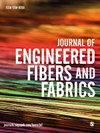Fabrication of ecofriendly jute fiber reinforced flexible planar composite as a potential alternative of leather
IF 2.3
4区 工程技术
Q1 MATERIALS SCIENCE, TEXTILES
引用次数: 2
Abstract
Natural fiber reinforced composites are a lightweight, affordable, and environmentally friendly replacement for many problematic applications. These natural fibers could be constructed into flexible planar materials with the aid of composite phenomena that can be used for a variety of applications where flexibility is important like as artificial leather. In this work, nonwoven matt made from spinning wastes of jute fiber was used to reinforce the biodegradable polyvinyl alcohol (PVA) matrix. The percentage of fibers within the PVA matrix was adjusted to develop the flexible planar composites. The nonwoven matt was immerged into the PVA solution casting mold with the aid of the solution evaporation approach. The flexible planar composite was then obtained through heat-induced pressing. Tensile strength, tearing strength, bending modulus, flexing endurance, abrasion resistance, and moisture management profiles of the developed flexible planar composite were assessed. Additionally, studies were performed for Fourier-transform infrared spectroscopy (FTIR) and thermogravimetric (TGA) analysis. The tensile strength has been found 7.78 N/mm2 with 9.84% elongation for a 1.2 mm thick flexible composite. The flexing endurance has been supported by no visible crack formation against 50,000 flexing cycles. The moisture management profile has been ensured by the hydrophobic surface of the composite. Developed flexible planar composite has been shown to have consistent mechanical performance for use as artificial leather, which could be appealing for the fabrication of leather-alternative bags, belts, and wallets.作为皮革潜在替代品的生态友好型黄麻纤维增强柔性平面复合材料的制备
天然纤维增强复合材料是一种重量轻、价格实惠、环保的替代品,可用于许多有问题的应用。这些天然纤维可以在复合材料现象的帮助下被构建成柔性平面材料,复合材料现象可以用于柔性很重要的各种应用,如人造皮革。以黄麻纤维纺丝废料为原料,采用无纺亚光增强可生物降解的聚乙烯醇(PVA)基体。调整PVA基体中纤维的百分比以开发柔性平面复合材料。借助溶液蒸发法将非织造亚光浸入PVA溶液浇铸模具中。然后通过热诱导压制获得柔性平面复合材料。评估了所开发的柔性平面复合材料的拉伸强度、撕裂强度、弯曲模量、耐弯曲性、耐磨性和水分管理特性。此外,还对傅里叶变换红外光谱(FTIR)和热重分析(TGA)进行了研究。抗拉强度为7.78 N/mm2,伸长率为9.84% mm厚的柔性复合材料。在50000次弯曲循环中,没有可见的裂纹形成,从而支撑了弯曲耐久性。复合材料的疏水表面确保了水分管理特性。开发的柔性平面复合材料已被证明具有一致的机械性能,可用于人造皮革,这可能对皮革替代袋、皮带和钱包的制造具有吸引力。
本文章由计算机程序翻译,如有差异,请以英文原文为准。
求助全文
约1分钟内获得全文
求助全文
来源期刊

Journal of Engineered Fibers and Fabrics
工程技术-材料科学:纺织
CiteScore
5.00
自引率
6.90%
发文量
41
审稿时长
4 months
期刊介绍:
Journal of Engineered Fibers and Fabrics is a peer-reviewed, open access journal which aims to facilitate the rapid and wide dissemination of research in the engineering of textiles, clothing and fiber based structures.
 求助内容:
求助内容: 应助结果提醒方式:
应助结果提醒方式:


